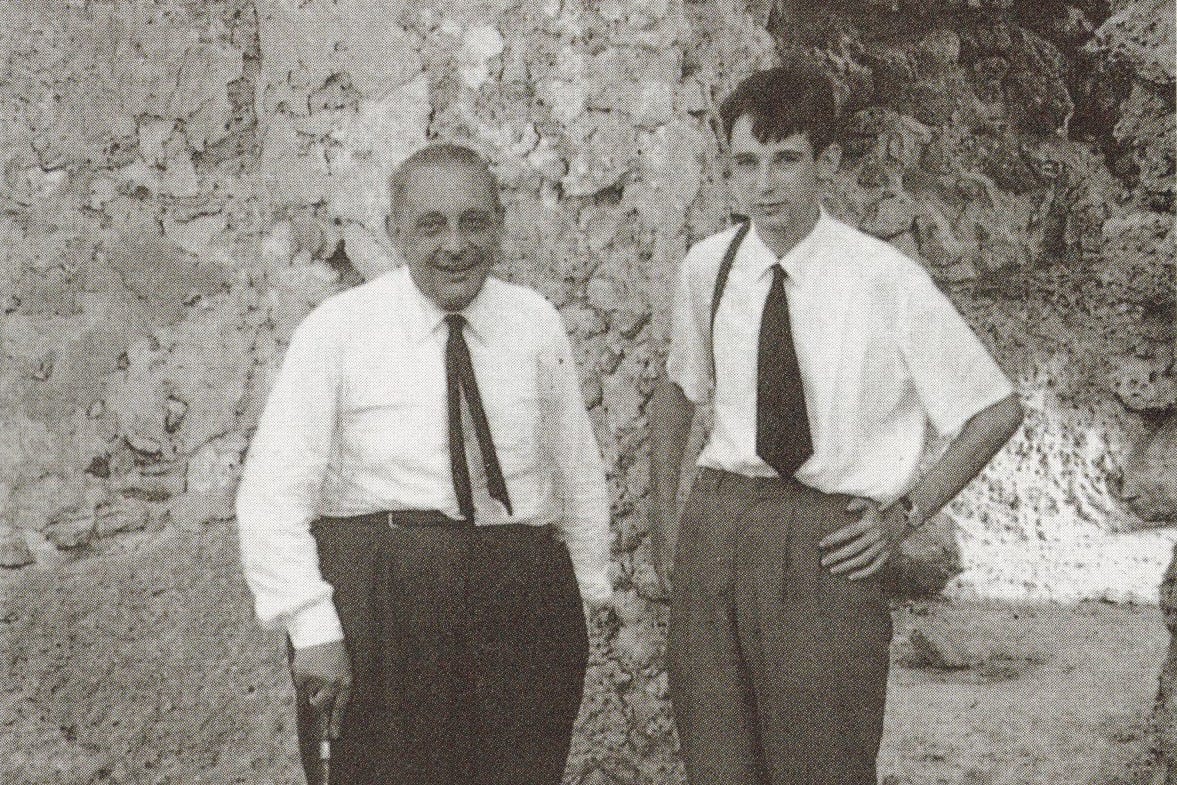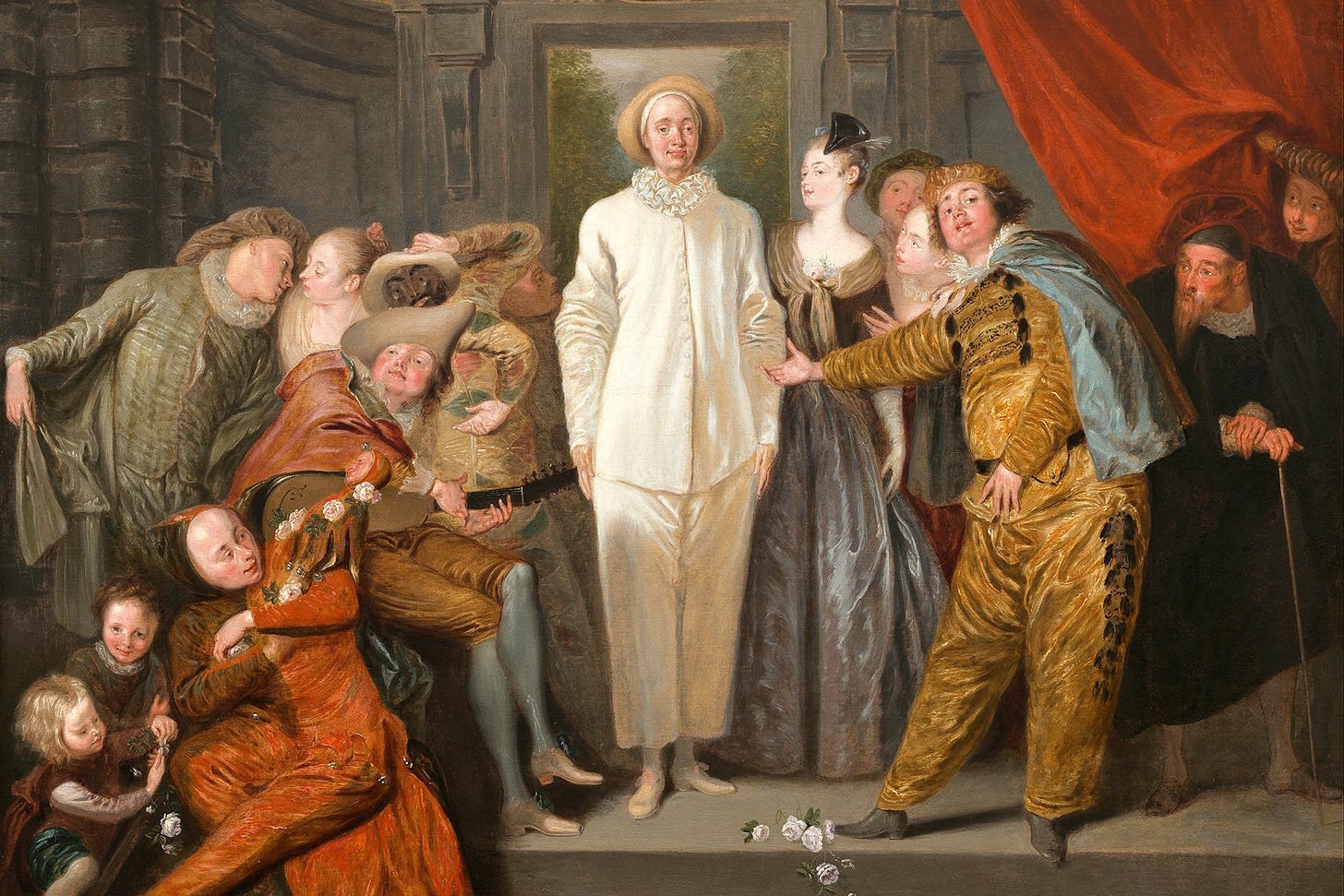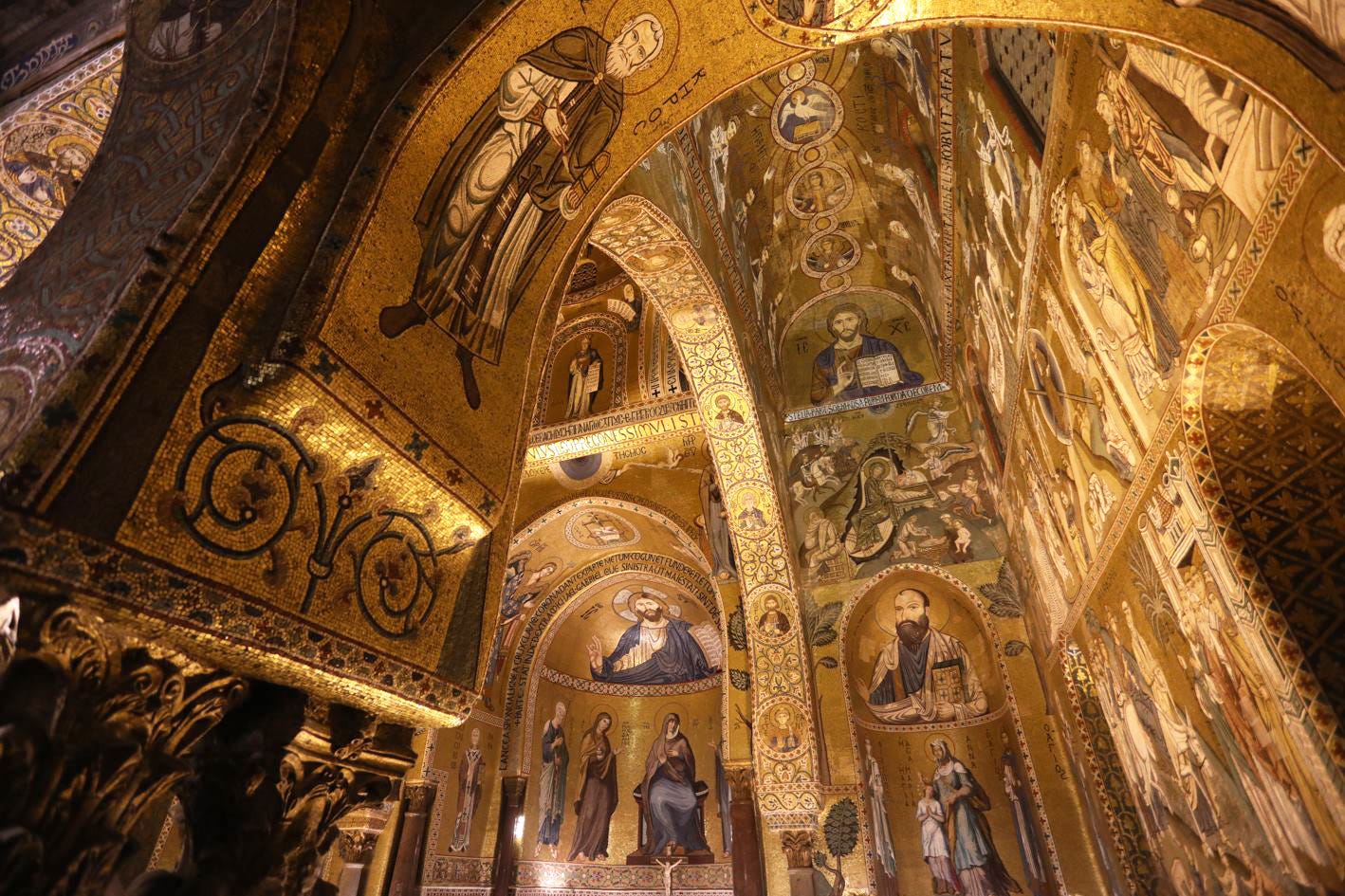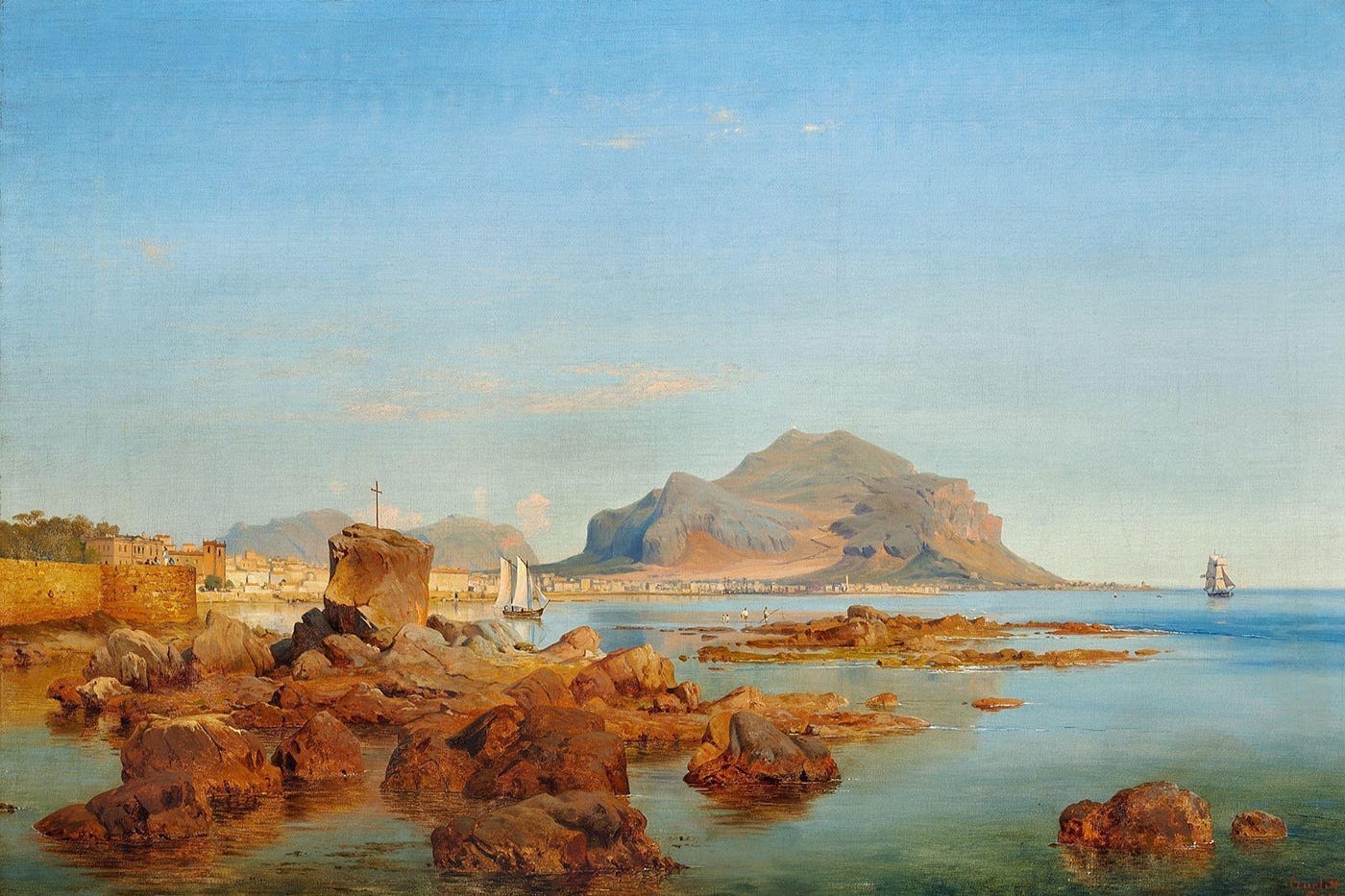Week 3: The Ultimate Paradox
The Leopard chapter I part III
Welcome to week three of The Leopard, in which I get a bit philosophical and existential. I didn’t necessarily plan on it, but life, and Giuseppe Tomasi, can wreck you just like that. Sorry!
This entry covers pages 18 to 34 of the Vintage Classics paperback edition, starting from “Next morning the sun lit on a refreshed Prince,” and ending with chapter I.
Tancredi
Last week we learned that the Prince’s nephew, Tancredi Falconeri, has been fraternizing with the rebellion, much to the displeasure of his relatives and fellow aristocrats. Today, with one of the cinematic tricks Tomasi is fond of, Tancredi’s pointy face makes its first appearance inside Fabrizio’s shaving mirror.
The cheeky young man, wearing his best sporting clothes, announces his decision to join the fight against the Bourbons. Fabrizio hides behind the grumpy uncle shtick but it’s clear how smitten he is with the boy. His affection is somehow self-centered: he loves and respects Tancredi more than the rest of the family because Tancredi reminds him of himself, therefore he must be smarter and better. As fond as he is of his other children, he dismisses them as dull, naive and cowardly.
Uncle and nephew are only apparently on opposite sides of the conflict. Fabrizio is a reactionary monarchist for the same reason Tancredi is a freedom fighter: to preserve their status. If aristocrats refuse to join the revolution now, he explains, they won’t have a say in the new government later. Tancredi is almost a satire of the romantic heroes that populated late 1800s pop culture and propaganda, his supposed love for freedom and democracy is calculated, egotistical. Fabrizio sees in his nephew the confirmation of all his theories about humanity and a justification for his own behavior.
“If we want things to stay as they are, things will have to change.”
This latest paradox is the most emblematic sentence in the novel, perfectly encapsulating Fabrizio’s (and Tomasi’s) philosophy. Empires will fall, old regimes will be replaced, different people will get to the top, but humanity will never change. We will always look after our own interests, we will steal, collude, wage wars, all the time hiding behind a veneer of legitimacy. Life is an eternal, stagnant cycle, and we’re stuck in it forever.
We all think we’re going to live forever, don’t we?
The world is a stage
A shaved and elegantly dressed Fabrizio, carrying his keys like a king in a castle, heads to his office for some morning play pretend.
The estate office was still empty, lit silently by the sun through closed shutters. Although the scene of more frivolity than anywhere else in the villa, its appearance was of calm austerity.
Fabrizio loathes this room and what happens inside. Paperwork, meetings, all very serious in appearance, are just for show. The parallels with King Ferdinand signing papers at his desk are obvious—men thinking themselves gods play with their toys, powerless against the course of history.
Just like the King, Fabrizio receives his subjects with pretend friendliness, speaks their dialect, acts the part of the feudal lord and master of his estates. He knows that it’s all for show, that the idyllic feuds painted on his walls are almost all gone, that his employees are robbing him blind. And they know that he knows; still they go through this comedy every morning.
Underneath his accommodating smile Fabrizio is seething with anger and disgust, his own self-importance wounded by having to play along with people he considers beneath him, servants that are about to become his equals, or worse, his masters. His title will become an empty one, but he might just get to keep it. (He reminds me of modern royal families: no real political power, prancing around in their crown jewels and fur coats like well-paid ornaments.)
At lunch, the Prince and his family attack with gusto a jelly tower that looks formidable and breaks with a spoon. When it reaches the youngest child, only ruins are left.
Earthly matters
Meanwhile, good-natured Father Pirrone is preoccupied with his own crumbling business. Soon the days of staunchly Catholic Bourbons will be over; he hears that people up there in Turin are into modern nonsense, liberalism, atheism, freemasonry and God knows what. Separation between church and state, who has ever heard of such a thing!
“Then, of course, our property, which is the patrimony of the poor, will be seized and carved up among the most brazen of their leaders; and who will feed all the destitute sustained and guided by the Church to-day?”
We’ve reached a historical oxymoron, one that has made philosophers scratch their heads for centuries: how can the Catholic Church preach poverty and accumulate wealth and power? Father Pirrone seems unbothered by the question. Helping the community is a sacred duty, and if a priest like him gets a little bonus now and then, a cushy job or biscuits for his coffee, it’s only to serve the Lord better.
He’s not even all wrong, Father Pirrone. The poorest people of Sicily are going to miss the security net the church had historically offered them. But we’ll see that later in the novel.
Heavenly sleep
Fabrizio isn’t inclined to join in on Pirrone’s self-pity. Despite the unpleasantness of his meetings, Tancredi’s departure, the war looming, he feels better in the morning. He looks out the window at the placid landscape unfolding in daylight; those same buildings that looked like monsters in the dark are now sheep sleeping peacefully under the blazing sun. The night is mysterious, alarming, the uncertainty keeps you awake. The day blinds you with the strength of its brightness; you gladly close your eyes and go to sleep. The apocalyptic sun is not invigorating, it’s debilitating.
The sun, still far from its blazing zenith on that morning of the 13th of May, was showing itself as the true rulerer of Sicily; the crude brash sun, the drugging sun, which annulled every will, kept all things in servile immobility, cradled in violence and abritrary dreams.
“Reassuring” is a recurring word in this chapter. Fabrizio is always looking for reassurance, always haunted by a vague sense of violence, of dread. The soldier in the garden, the lambs in the kitchen, executions in the square, revolution at the door. He contemplates morphine, that new medicine the Americans will soon use in their Civil War. To stop hurting, to forget, to sleep.
Oblivion.
He tries to impose order to the chaos of the night, the tangle of roots decaying in darkness. Astronomy is reassuring too, math and calculations keep no secrets from him. The stars are his morphine. And as he loses himself up there in the cosmos, for a few, happy hours he sheds his mortality and touches the divine. The painted gods fall silent, just like when he prays, and he’s puzzled when Father Pirrone reminds him of the Sacrament of Confession. Hasn’t he just been commuting with God? Haven’t humans been transcending their bodies since time immemorial? Bacchantes drank wine, oracles breathed ethylene, saints fainted in ecstasy, dervishes whirled on the spot, Italians danced the tarantella. Through Fabrizio, Christian rites regress to their pagan roots.
“Taranstism” is a therapeutic form of dance that originated in southern Italy. Blaming the bites of tarantulas, peasant women swore that launching in a dance frenzy was the only way to fight back the venom. The true origins of Tarantella go back to ancient Dionysian rites, sacred nights when people (and especially women) sought a state of trance through music, alcohol, opium and sex. Ecstasy became divine sublimation, prayer, exorcism, temporary escape from the pain and mortality hiding behind a spider bite.
Flesh and soul
Bendicò the Great Dane is a metaphor for Fabrizio’s humanity, his rawest, most sincere self, built like a killer and innocent like a puppy, a creature stupendously alive carrying a name in the past tense.

Bendicò is in pain during the day’s meetings, he barks at servants while Fabrizio smiles at them, he plays with the family when Fabrizio is a bully, he wants to follow Tancredi into battle. When the Salina family prays, Bendicò is not allowed in. When Fabrizio studies the skies, he’s left firmly on the ground. Most of all, he yearns to explore the garden, to study the putrid smells that horrify yet fascinate Fabrizio: that final, messy end, courted and feared, exorcised daily with small, palliative imitations.
Bendicò wants to be let in on those secret rites but cannot possibly understand them. Mortal body, immortal soul, the ultimate paradox. The one secret we will never figure out.
The cycle of life and death
Salve, Regina, Mater misericordiae.”
Twenty-four hours have passed, the sun and its mirror, the moon, have completed their rotation. The family once again gathers in the drawing room for their daily Rosary. The chapter begins at the end, ends at the beginning: a snake biting its tail. Life is a perfect cycle.
“If we want things to stay as they are, things will have to change,” Fabrizio reassures himself.
General Garibaldi has landed on Sicilian soil.
We all think we’re going to live forever.
How are we feeling, Leopard gang? Having fun yet? Are you loving Tarantella as much as me? Next chapter we’re going on a journey, we’ll be reading from pages 35 to 44, up until the line, “and from that moment, invisibly, began the decline of his prestige.” Here are your reading schedule and character list, and if you haven’t yet, don’t forget you can subscribe for free.
Till next time!







Thanks for the interesting notes once again. I’m intrigued by Bendico as the prince’s humanity. This week I was also struck by the different way the prince interacts with Paolo and Tancredi. I felt a bit sorry for Paolo. I wonder if they will be “2 sides of a coin” going forwards.
“…lit silently by the sun through closed shutters…”. As elegant as writing gets.